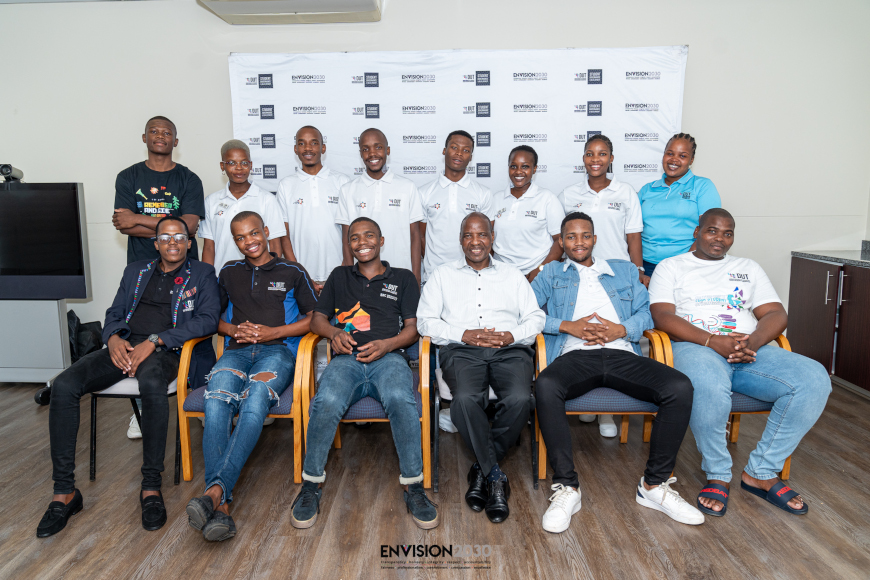To enhance the leadership skills of the Student Representative Council (SRC), the Student Governance and Development unit at the Durban University of Technology (DUT) hosted the Stress Management and Conflict Resolution Capacity Development Session at the Indumiso campus in Pietermaritzburg on Wednesday, 28 February 2024.
The session was facilitated by Mr Masiza Ngculu, Student Governance and Development Manager who began by introducing the SRC to the Interim Campus Director of the Midlands campuses, Professor Mashupye Kgaphola, expressing their desire for collaboration on projects.
The SRC led by its President, Mr Solomzi Zoleka were warmly welcomed by Prof Kgaphola. He expressed his interest in building relations with the SRC through conversations.
“Ultimately our relationships are a function of our conversations. The quality of our relationship must reflect the quality of our conversations. If I desire a particular kind of a relationship with the SRC, I must work on our conversation. It must be a conversation that befits the outcome I desire. If there is no conversation, there will be no relationship,” said Prof Kgaphola.
He believes a mutually beneficial relationship between the university management and the student leaders will be built by the quality conversations and engagement they have with each other. To discover, teach, know one another and grow intellectually, Prof Kgaphola feels both management and the SRC must invest in quality conversations, which will lay down a foundation for a quality future.
Delivering the opening remarks, Ms Thokozani Sibiya, a Student Development Officer under the Student Governance and Development at DUT mentioned that the session was the first of a series of capacity development sessions that they have planned for the SRC. She urged the SRC to interact and engage in the sessions, saying it will give them the opportunity to grow as they fulfil their duties.
Dr Mfanozelwe Shozi, Imbali Education and Innovation Precinct (IEIP) Project Manager delivered an insightful presentation on Conflict Resolution. Dr Shozi who obtained his Doctor of Philosophy (PhD) in Public Administration at DUT in 2023 explained that his dissertation titled: Utilising Action Research to Build Peace at Njobokazi Village, KwaZulu-Natal (KZN), was based on conflict resolution. His aim was to equip the SRC with the necessary skills to handle conflict.
Dr Shozi encouraged the SRC aspire to have the peace building skills, where conflict is always resolved with a win-win situation. He assured them that conflict resolution helps to build relationships and trust.
“In a conflict resolution situation, always look at the concerns and find ways to address them. Under each problem, identify the root causes and address them. Don’t compromise the core issues for a win-win situation,” shared Dr Shozi.
To test the SRC’s knowledge on conflict resolution and what they have learnt during the session, Dr Shozi gave them a chance to draw up a conflict resolution plan, working in groups. The plan was on any issue of their choice, which had to be resolved peacefully. Key role-players, resources and time frames had to be identified, whilst coming up with a win-win transformation programme. The student leaders whom all identified the issue of student protest action were happy to share their plans and activities in resolving the conflict peacefully.
Senior Psychologist under the Student Counselling and Health unit, Mr Sihle Mbanjwa spoke at length about stress management. He began by defining stress as mental, physical, emotional and behavioural reactions to any perceived demands or threats. He encouraged the SRC to learn ways to deal with stress or ways to reduce stress.
“You find people saying they are used to stress or have learnt to live with it. You don’t own stress, do something to deal with it. The more you tolerate stress, you are likely to develop other health conditions. Open up to people you trust and those confided into must listen without judgement. Always find a way out of stress, if not seek professional help,” said Mbanjwa who encouraged the SRC on their approach to a situation to make it less stressful.
Suggesting ways to reduce stress, Mbanjwa said:
1. Find a support system, someone to talk to about your feelings.
2. Change your attitude, find ways to think about stressful situations.
3. Be realistic, set practical goals.
4. Get organised and take charge as being unorganised or engaging in poor planning often leads to frustration or crisis situations, which leads to feeling stressed.
5. Take breaks, give yourself “me time.”
6. Take good care of yourself, eat properly and get regular rest.
7. Learn to say no, learn to pick and choose which things you will say yes to.
8. Get a hobby, do something different.
9. Slow down, know your limits and cut down on things you try to do each day.
10. Laugh, use humour to de-stress.
11. Learn to relax by developing a regular relaxation routine.
In closing, Mr Andile Masuku, Student Development Officer at DUT, extended his appreciation to the SRC for their attendance and participation to the session. He advised them to continue engaging in the sessions as it helps the Student Governance and Development unit to be able to plan further.
“Our session was deliberate. During your induction, you had suggested that for Capacity Development Sessions we begin with conflict resolution and stress management and we heard your plea. We will be hosting a series of the Capacity Development Sessions and we seek your full participation and engagement,” said Masuku.
He indicated that on 15 to 17 March 2024, they will be hosting the SRC Team Building session outside of DUT, to create unity amongst the student leaders based in the Durban and Midlands campuses.
Pictured: The SRC 2023/23 with the Interim Campus Director of the Midlands campuses, Professor Mashupye Kgaphola.
Photographer: Khulasande Tshayile.
Simangele Zuma

